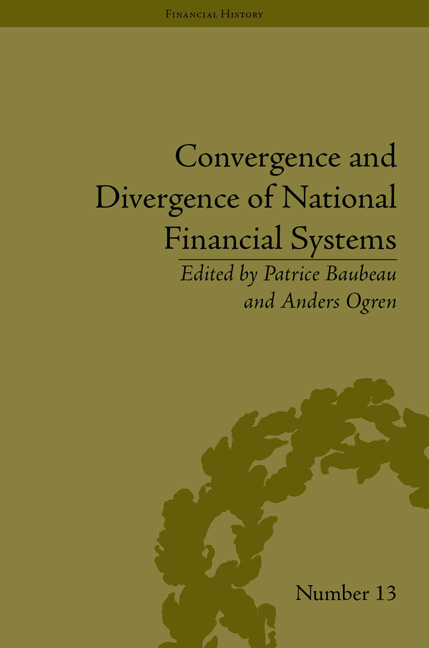 Convergence and Divergence of National Financial Systems
Convergence and Divergence of National Financial Systems Book contents
- Frontmatter
- CONTENTS
- Acknowledgements
- List of Figures
- Introduction
- Part I The Social Mechanisms of Financial Convergence
- Part II National Convergences and Divergences in the Long Term
- Part III Convergence and Historical Shocks
- Part IV Convergence and Monetary Constraint
- 10 The Establishment of the Gold Standard in Southeast Europe: Convergence to a New System or Divergence from an Old One?
- 11 Money Creation under the Gold Standard: The Origins of the Italian Banking Crisis of 1893
- 12 Financing Germany: Amsterdam's Role as an International Financial Centre, 1914–31
- Notes
- Works Cited
- Index
12 - Financing Germany: Amsterdam's Role as an International Financial Centre, 1914–31
from Part IV - Convergence and Monetary Constraint
- Frontmatter
- CONTENTS
- Acknowledgements
- List of Figures
- Introduction
- Part I The Social Mechanisms of Financial Convergence
- Part II National Convergences and Divergences in the Long Term
- Part III Convergence and Historical Shocks
- Part IV Convergence and Monetary Constraint
- 10 The Establishment of the Gold Standard in Southeast Europe: Convergence to a New System or Divergence from an Old One?
- 11 Money Creation under the Gold Standard: The Origins of the Italian Banking Crisis of 1893
- 12 Financing Germany: Amsterdam's Role as an International Financial Centre, 1914–31
- Notes
- Works Cited
- Index
Summary
After Germany's defeat in 1918 by the Entente, the economic prospects of the country were dire. High inflation, political turmoil, famine, the loss of significant areas of high industrial and agricultural importance, and the prospect of punitive damages to be paid to the victors – the height of which were being discussed at Versailles – weakened the German economy. To the Netherlands, the German economic difficulties threatened to have disastrous consequences. Since the start of industrialization in both countries during the 1860s they had become economically dependent upon one another. The Ruhr area in Germany – near the Rhine, close to the border with the Netherlands – had by the start of the war become Europe's most important industrial region. For the transportation of the raw materials it needed and the products it exported, it relied on shipping along the Rhine and railroad transportation. In the Netherlands, the transport sector – sea shipping, Rhine shipping, railroad traffic, transhipment and related activities in the Dutch ports of Rotterdam and Amsterdam – relied on the Ruhr industry. The densely populated Ruhr also needed to import foodstuffs, and a large portion of Dutch exports were shipped there. The importance of the Netherlands as a supply route and supplier to the Ruhr is illustrated by the fact that Germany decided to respect Dutch neutrality during the Great War. As the German Chief of General Staff, Helmuth von Moltke, put it as early as 1909: ‘it will be of great importance to have in the Netherlands a country whose neutrality allows us to import and export. It has to remain our windpipe, allowing us to breathe’.
Dutch–German economic bonds were strong, and a German economic recovery was thus important to the Netherlands. Immediately after the war, influential Dutch bankers such as C. E. ter Meulen of Hope & Co. and G. Vissering, president of the Dutch central bank, were internationally active, trying in vain to enable not only Germany, but the entire world to resume international trade by promoting plans for international loans, barter or bilateral clearing.
- Type
- Chapter
- Information
- Convergence and Divergence of National Financial SystemsEvidence from the Gold Standards, 1871–1971, pp. 219 - 240Publisher: Pickering & ChattoFirst published in: 2014


